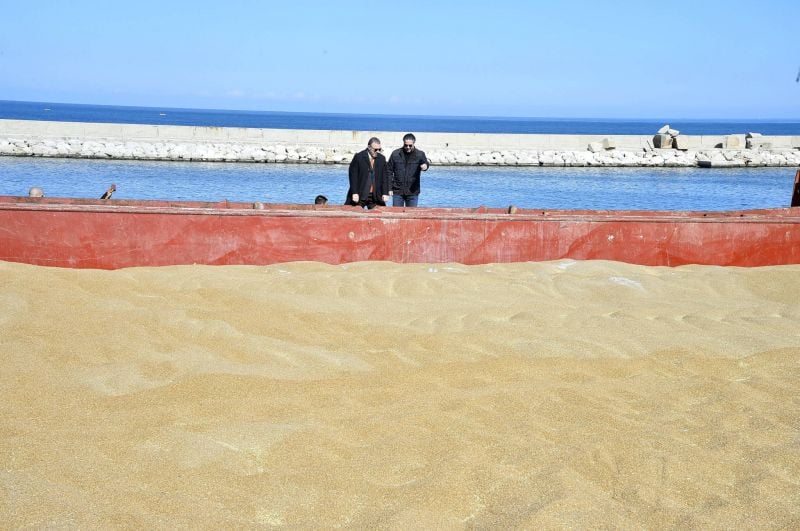
Caretaker Economy Minister Amin Salam inspects a shipment of wheat financed by the World Bank at the Port of Beirut. (Credit: Dalati and Nohra)
BEIRUT — A first shipment of 33,000 tons of wheat arrived Saturday at the Port of Beirut, in order to "rebuild Lebanon’s wheat stock" and ensure that "poor and vulnerable" populations can get bread, the World Bank, which is financing these imports through a loan, announced in a statement.
Present at the port on the arrival of the Super Bayern ship carrying these supplies, caretaker Economy Minister Amin Salam, said that the World Bank loan covering the wheat imports ensures the "availability" of this foodstuff and stabilizes the price of bread, in a country where the shadow of shortages regularly looms over the inhabitants against the backdrop of an ongoing economic crisis.
The financing of wheat imports is part of an emergency project the World Bank approved in May 2022 and that amounts to $150 million. The Lebanese Parliament approved the loan last October.
The 33,000 tons are equivalent to "about one month's consumption of Arab bread in the country," according to the World Bank's statement. "Other shipments, of different sizes, will follow in the coming months," the international organization added, saying they would "help replenish Lebanon's wheat stock and ensure affordable bread for poor and vulnerable households."
'Just-in-time fashion'
The World Bank recalls, moreover, that Lebanon imports nearly 80 percent of its wheat and that these imports have been severely impacted by the war in Ukraine, which began on Feb. 24, 2022.
Before the invasion of Ukraine, 80 percent of wheat imports came from Ukraine and 16 percent from Russia, adds the text, which stresses that due to the current crisis in the country and since the explosion at the Port of Beirut on Aug. 4, 2020, which destroyed the wheat silos in the capital and therefore their storage capacity, "wheat imports have been handled in a just-in-time fashion."
The release did not specify where the wheat came from, but according to ship-tracking site MarineTraffic, the Super Bayern's voyage began in the port of Novorossiysk, Russia.
“Bread is an essential staple in the poorest people’s diet. Any disruption of the wheat value chain will primarily impact poor and vulnerable host communities and refugees,” Jean-Christophe Carret, the World Bank's director of operations for the Middle East, said in the statement.
Availability and price stability
For his part, Salam said, "We promised the Lebanese people to protect their bread and we delivered proudly and successfully, thanks to our partner the World Bank."
"The loan will provide great relief through stability in wheat availability and bread prices in Lebanon during the country’s most challenging times,” he added.
At a press conference announcing the start of the World Bank project on Jan. 24, Salam said the loan would ensure the supply of subsidized wheat for nine to 12 months — the exact duration depending on the world price of wheat.
After the program ends, the ministry plans to work on a subsidy card exclusively for the purchase of bread, targeting people with low purchasing power, the minister added.
In addition, the caretaker government approved last week an allocation of $8 million of Lebanon's Special Drawing Rights for the purchase of wheat. Salam said the $8 million would serve as a temporary stopgap measure to cover the transition period until the first World Bank funded shipment arrives.
However, this arrived less than a week after the funding was approved.